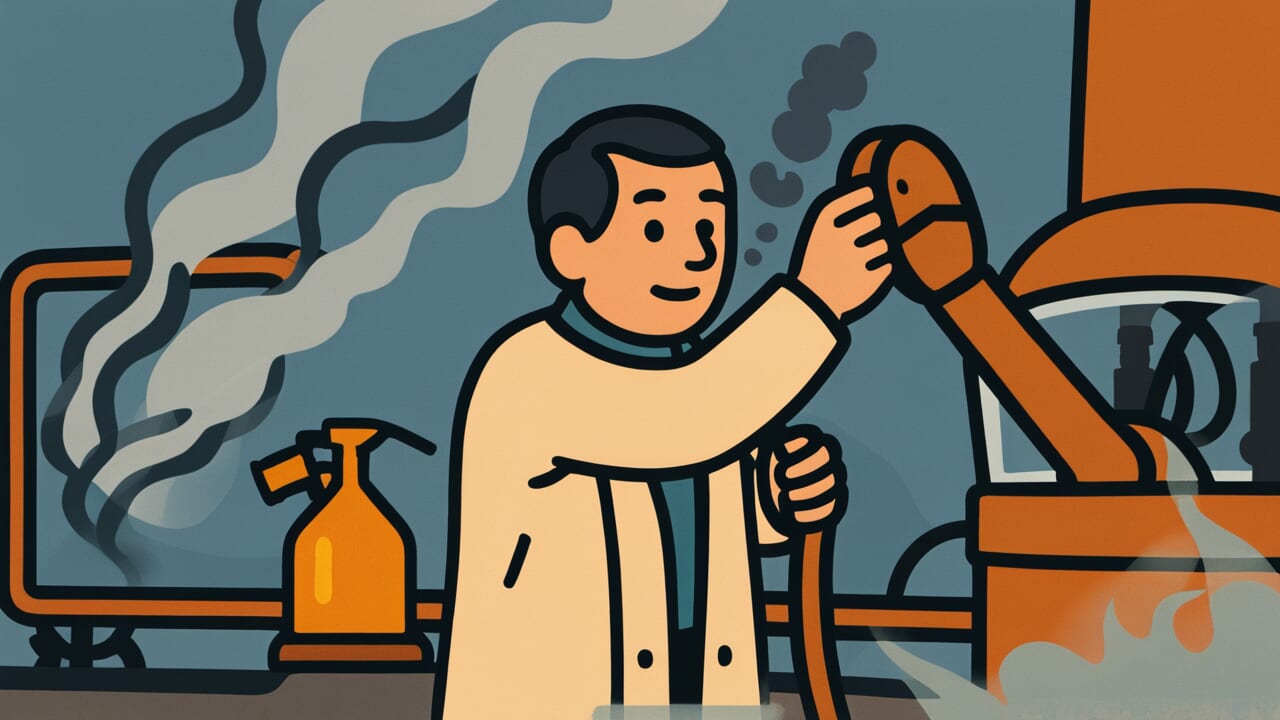How to Read “Use oil to remove oil soot”
Abura wo motte yuen wo otosu
Meaning of “Use oil to remove oil soot”
“Use oil to remove oil soot” is a proverb that means using something of the same type or quality to achieve effective results, just as oil removes oil soot.
When solving problems, using something similar to the cause might seem counterproductive at first. But things with the same properties can actually work most effectively.
Oil soot contains oil, so water doesn’t remove it well. But oil works perfectly.
This proverb teaches us the importance of understanding the true nature of things. Even when something seems contradictory on the surface, understanding its properties reveals the most effective solution.
People still use this saying today when solving problems by utilizing similar qualities. It shows how important it is to understand someone’s position or nature and choose methods that match them.
Origin and Etymology
No clear written records explain the origin of this proverb. However, the structure of the phrase offers interesting insights.
“Oil soot” refers to the soot produced when burning oil. In old Japan, lamps and lights using rapeseed oil or fish oil were the main sources of lighting.
Continuous use left black oil soot on ceilings and walls. This soot was hard to remove with water, making cleaning difficult.
However, wiping with oil removed the soot easily. Oil soot is a mixture of carbon and oil components, so using oil dissolves it and allows clean removal.
This method makes chemical sense and was likely part of people’s everyday wisdom.
This practical cleaning knowledge eventually took on metaphorical meaning. The idea of using something with similar properties to solve problems came from observing daily life.
The expression stuck with people because it used oil, a familiar material. This is an example of practical wisdom rooted in everyday life becoming a life lesson.
Usage Examples
- Sales techniques are like “Use oil to remove oil soot” – starting with topics about shared hobbies makes negotiations go smoothly
- During a child’s rebellious phase, the “Use oil to remove oil soot” approach works – when parents share their own youthful mistakes, kids open up
Universal Wisdom
The proverb “Use oil to remove oil soot” contains the essence of problem-solving that humans have developed throughout history.
When facing difficulties, we tend to try opposite approaches. We counter strong opponents with force, repeatedly persuade stubborn people, and try to solve problems with methods different from their causes.
But this often doesn’t work.
This proverb teaches the wisdom of assimilation, not confrontation. Deeply understand the nature of the other person or problem, and choose methods that align with that nature.
This isn’t just a technique – it’s an insight into the essence of human relationships.
Why is this wisdom universal? Because humans instinctively feel affinity for “things similar to themselves” and open their hearts to them.
We feel comfortable with people who speak the same language, share the same experiences, or hold the same values.
Our ancestors reached this deep human understanding by observing the familiar phenomenon of oil soot. Rather than forcefully suppressing problems, they naturally resolve by aligning with their essence.
This flexible thinking is why this wisdom has been passed down through the ages.
When AI Hears This
Oil stains don’t come off with water but do with detergent because of the “like dissolves like” principle at the molecular level. Chemistry classifies molecules by a property called “polarity.”
Water is a polar molecule with electrical imbalance, while oil is a nonpolar molecule without imbalance. The greater this difference, the less they mix; the more similar, the better they dissolve.
This is quantified by solubility parameters – water is 47.8, oils are around 15-18. This difference is too large, so water and oil never mix.
What’s interesting is that this numerical difference represents the “distance to problem-solving.” For the problem of oil soot (parameter around 16), water (47.8) is too far away to reach.
But oil (16-18) has nearly zero distance, so it slips right in and dissolves it. To solve problems, you don’t need powerful force from far away, but properties that perfectly align with the problem.
The same pattern appears in human relationships. Former delinquents are effective in rehabilitating troubled youth because someone with shared experience (small parameter difference) reaches their hearts better than lecturing adults (large difference).
Alcoholics Anonymous works because empathy among fellow sufferers (same type) has dissolving power that doctors’ advice (different type) lacks. The closer the “chemical distance” between problem and solution, the easier change occurs.
Lessons for Today
This proverb teaches modern people that problem-solving requires “understanding,” not “confrontation.”
In modern society, differences of opinion and clashing values occur everywhere. At such times, we tend to assert our own correctness and try to change others.
However, this proverb shows a different path. Stand in the other person’s position, speak in their language, and start from their interests.
Doing so can make things progress surprisingly smoothly.
This wisdom applies at work and at home. When guiding subordinates, choose words that align with their values rather than giving orders.
When facing children, enter through their worldview rather than parental logic. When dealing with customers, align with their needs rather than your company’s convenience.
This isn’t about compromising. It’s a wise approach of understanding the other person’s essence and choosing the most effective method.
If you feel things aren’t going well with someone right now, pause and think. By standing at the same eye level as the other person, you should find solutions that become visible.



Comments